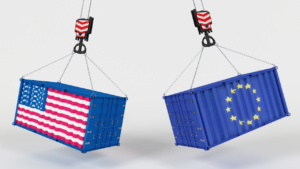President Trump made headlines again, this time announcing a sweeping 10% tariff on all goods coming into the U.S., with even higher rates to follow for certain products and countries. He framed these as “reciprocal” tariffs, meant to mirror the tariffs other countries impose on U.S. goods.
Markets didn’t take the news well. Stocks dipped on fears that a full-blown trade war might be brewing, one that could slow growth here at home and ripple across the globe. It’s the kind of news that triggers anxiety and urges us to act fast. But as we’ve learned, both from experience and brain science, that’s exactly when we need to slow down.
Let’s take a breath together.
Kneejerk reactions almost never serve investors well. Yes, the risks are real, and yes, things may feel uncertain. But this story is still being written. The tariffs could stick, or they could disappear just as quickly as they arrived. We’ve seen it happen before.
If the tariffs do hold, it’s true the U.S. economy might take a hit, but we’re heading into this moment with some solid fundamentals: a strong labor market and steady consumer spending, especially among middle- and upper-income households. Other countries, which rely more heavily on U.S. trade, may feel the squeeze even more. That dynamic could nudge countries toward the negotiating table, which may ultimately soften the impact.
Still, we can’t ignore the possibility of prolonged tension. A real trade war could lead to broader economic challenges. But here’s the thing, trying to time the market around this is like trying to predict a teenager’s next mood swing. Nearly impossible and, frankly, exhausting.
We take comfort in knowing the Federal Reserve is paying close attention. Fed Chairman Jerome Powell has suggested that any inflation from the tariffs is likely temporary. If growth slows significantly, the Fed may be willing to step in with interest rate cuts. That flexibility helps cushion the blow.
I know days like this can be unsettling. But remember the words of Warren Buffett: “Be fearful when others are greedy, and greedy when others are fearful.” When markets move from overconfident highs to panic-driven lows, the pendulum often swings too far—and that creates opportunities for long-term investors.
Let’s also remember the power of diversification. It’s still working. International markets may be down, but not as steeply. Bonds are up sharply, helping to offset some of the equity losses. This isn’t the first uncomfortable market correction, and it won’t be the last. What matters most is not how the market performs today, but how we respond to it.
Our advice right now is to stay grounded. Focus on your long-term goals—the dreams you’re building for yourself and your family. We’ll continue to monitor everything closely and will make recommendations when needed. But right now, the best course of action is patience and perspective.
We’re in this together.

